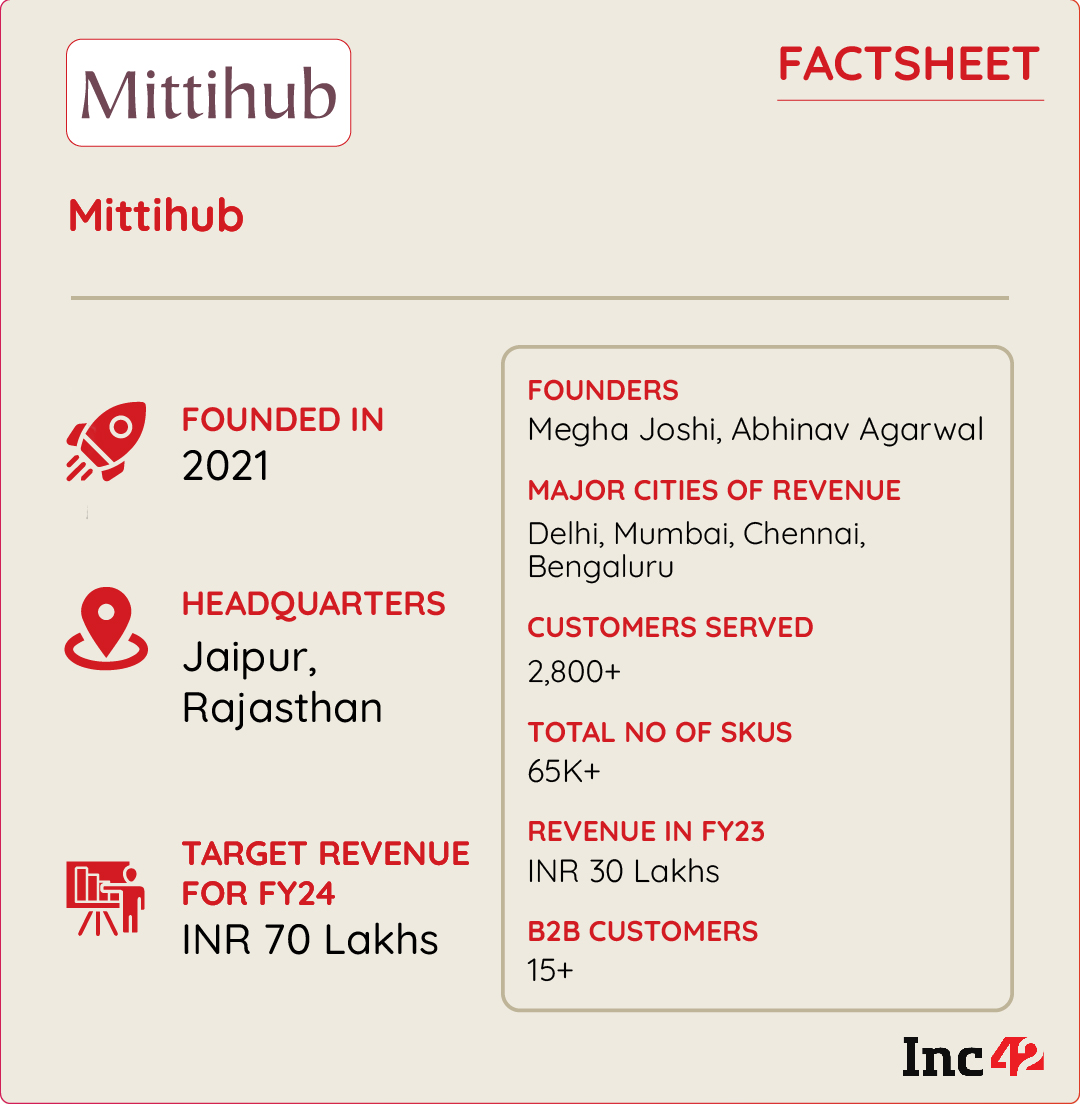Startup Stories
How Mittihub Is Reviving & Preserving The Dying Terracotta Craftsmanship In India

Back in 2021, business scholars Megha Joshi and Abhinav Shukla could not have foreseen that their college project would eventually play a pivotal role in reviving and preserving the fading Indian terracotta industry. Years later, Joshi and Shukla are now the cofounders of Mittihub. The startup specialises in making and selling a variety of terracotta products, including cookware, soap dispensers, decor, planters, tableware, exclusive decor items, and utensils, through its website.
In this process, the startup works with as many as 50 artisans, who meticulously handcraft these items. These products are then sold anywhere from INR 400 to INR 25K or above, ensuring that the hands that crafted them get the maximum monetary benefit.
For the uninitiated, terracotta holds cultural significance in India because it has been the medium for art since the Harappan civilization and has persisted for thousands of years. In this art form, artisans typically use rust-orange colour clay to create figurines, sculptures and other tangible items.
Now, coming back to the protagonists of our story, the duo started studying this space (majorly due to their interest) for their college project. As they were digging deeper to understand the scope of their project, a realisation struck them that a dearth of demand for terracotta products has the potential to make this space obsolete.
The deeper they dug, the more they could relate to the cause of preserving this art and the artisans who today are under the weight of saving this dying craft form and earning a livelihood from the same.
“These terracotta artisans in rural India carry double weight – as the custodians of the art form and creating a livelihood out of it. Consumerism has shifted to machine-made mass-produced goods, leaving behind uniquely crafted products,” Shukla said.
The cofounders told Inc42 that after realising the situation of terracotta artisans, they knew what had to be done next, resulting in the incorporation of Mittihub.
According to the startup’s website, Mittihub is a ‘social venture’, which is trying to ‘bring in a change in the handicraft industry’ by ‘reviving the dying art form of pottery’.
Besides, the founders also started a pottery studio in 2022. Initially, they spread awareness among people about the efforts and time invested in crafting and creating each terracotta product. Soon, people started to join their cause.
“And this was just the start… Our studio soon became a therapeutic space for many who would join to discover craftsmanship in them, work on the pottery wheel and engage in creative tasks,” Shukla said.
“Before we could realise, artisans associated with us were making 200% more than what they would generally make,” added Shukla.
The bootstrapped startup has served more than 2,800 customers since its inception and has a total of 70 SKUs across five product categories. Besides, the startup has 15 B2B customers (resorts and designers) to whom it provides custom-made designs by leveraging the skills of its 50-artisan network.
These B2B customers aid in Mittihub’s brand exposure to their customers, furthermore helping in revenue generation.
According to Shukla, the cofounders were not alone in their quest to save art and its custodians as they received constant support, mentorship and financial assistance under the Rajasthan government’s iStart initiative.
As a result, the startup was able to generate revenue to the tune of INR 30 Lakh in FY23. The founder duo is now aiming for a revenue of INR 70 Lakh in FY24, registering a growth of 133% year-on-year (YoY).

From A College Project To A Full-Fledged Business
The founders of Mittihub embarked on their entrepreneurial journey with a team of seven undergraduates, five artisans and an initial investment of INR 50K. However, as soon as they started, they discovered that there wasn’t much demand for these products.
To overcome this, the cofounders and their team planned a campaign to convince urban customers to buy terracotta products. As part of this, they started educating their target audience about the health benefits of using terracotta utensils, to start with.
Once they witnessed an uptick in the demand, another key issue was staring right at them. This challenge was related to 20% of goods getting damaged in transit, which was not only adding cost pressures but also impacting their goodwill in the market.
To resolve this, the Mittihub team soon pivoted to sourcing sustainable packaging, which helped the startup bring its damages under 1%.
Shukla told Inc42 that since they started in 2021, Mittihub has strategically carved its market niche through unique marketing approaches. The duo conveys the artisans’ stories to emotionally connect with users, complemented by performance and influencer marketing on social media.
Further, as far as the customer retention strategy is concerned, they thrive on sending personalised cards and showcasing the customer’s impact on the startup and the lives of the artisans. Besides, the Mittihub team actively conducts soil testing to validate the authenticity of the clay, which is used to make cookware.
Exploring The Craft Behind Mittihub
Speaking with Inc42, Shukla said that the Mittihub team gets the contact details of artisans from government sources. Following this, the team ventures to their locations to identify and gauge artisans’ skills.
Artisans with basic required skill sets are hired and Mittihub upskills them for two months, particularly in cutting work and ‘Kagzi’ pottery (involving creating design using paper cut out), along with refining techniques.
During these two months of training, artists learn everything from preparing the clay to furnishing the final product.
Shukla said that Mittihub’s USP in the terracotta craft market lies in its utility-oriented product range. From cookware to serveware and home decor, the startup’s product spectrum caters to diverse needs.
Additionally, its products range from small pots to larger 40-inch varieties, offering a comprehensive selection to meet various preferences and purposes.
Shukla said that there is minimal use of technology in product creation, however, tech plays an important role in helping it scale business online and delivering the products right to customers. Technology not only streamlines the logistics of delivery but also provides real-time tracking, ensuring customers can monitor their orders at every post-purchase stage. This transparency contributes to a more reliable and customer-centric delivery system, ultimately enhancing the overall satisfaction of the buying experience, claims Shukla.
While talking about the B2B side of the business, the company partners with interior designers and resorts to create customised products for them.
Apart from selling its products on its B2C website, Mittihub’s products can be found on marketplaces like Amazon and Jaipur Rugs.
The startup earns 30% of its revenue from websites and online marketplaces, while 10% is generated from the pottery studio. B2B partnerships account for the remaining 60% of the revenue including hotels, offline stores and event management. Most 70% of Mittihub’s revenue is generated from Tier I markets, remaining 30% from Tier II and III regions.
Indian Handicrafts Get The Ecommerce Lifeline
Mittihub envisions several expansions in its future, with plans to extend support to artisans in the southern regions of the country where terracotta art holds potential. Currently, the focus is on limited raw products in these areas.
To achieve this vision, Mittihub plans to train and collaborate with artisans in these regions, enhancing their skills. Furthermore, the company aims to broaden its global footprint and collaborate with diverse stakeholders to boost revenue and elevate brand recognition internationally.
Shukla believes that ecommerce has positively impacted the growth of handicrafts in India. “Ecommerce platforms like Jaypore, Swadesh and Aadyam play a pivotal role in the growth of handicraft items,” he said.
For the uninitiated, these ecommerce platforms provide a gateway for Indian crafts to reach a larger audience, offering consumers a variety of accessible art forms while empowering artisans to continue their craft from their villages.
Moving on, the government, too, recognises the potential of ecommerce in facilitating the growth of the fading Indian handicraft sector.
In April 2023, the Ministry of Textiles launched an ecommerce portal to connect over 35 Lakh handloom weavers and 27 Lakh handicraft artisans directly with buyers. The website allows consumers to purchase various handicraft products such as clothing, home decor, and jewellery, showcasing India’s cultural heritage.
Moreover, the platform provides a pathway for 62 Lakh weavers and artisans to become digital entrepreneurs, offering growth opportunities in traditional crafts while celebrating India’s rich cultural legacy.
In the context of terracotta, startups like Clay Mango, Terracrafts, and Mitticool are leaving no stone unturned to promote this craft.
Notably, the handicraft market was valued at nearly $4 Bn in 2022 and is projected to reach $6.2 Bn by 2028.
Startup Stories
Byju’s partially pays March salaries, pending February payouts.

Byju’s, a prominent player in the edtech industry, has encountered financial challenges resulting in delayed salary payments for its employees. As of April 20, the company has only disbursed a portion of March salaries, attributing the delay to a severe cash crunch. Despite earlier assurances from the company’s management that salaries for March would be paid by April 18, many mid-senior employees have reported receiving only 50% of their March salaries. Additionally, February salaries remain unpaid for a significant number of employees, further exacerbating the situation.
Founder and CEO, Byju Raveendran, has resorted to raising personal debt against his stakes in the company to facilitate salary payments. This underscores the severity of the financial challenges facing Byju’s and highlights the lengths to which Raveendran is willing to go to address the issue.
Employee testimonies reveal the extent of the salary delays, with one employee stating that they received only 50% of their March salary on April 20, with 80% of their February salary still pending. Another concerning aspect is the reported disparity between junior and senior employees, with junior staff receiving full salary payments while top management has gone without salaries for the past two months.
Byju’s has acknowledged the delay in salary payments but has not provided a detailed explanation for the situation. A company spokesperson declined to comment on queries from ET regarding the matter. In an email sent to employees on April 8, the management team expressed regret over the delay and attributed it to the inability to secure approval to access funds from a rights issue. The delay has been further compounded by actions from foreign investors, hindering the company’s access to necessary funds.
This revelation follows a previous report by ET on April 1, which highlighted Byju’s decision to delay salary payments due to constraints imposed by warring investors, limiting the company’s access to funds through a rights issue. The ongoing dispute with investors, including Dutch investor Prosus, has added to Byju’s financial woes and has led to further delays in resolving the issue.
In a separate development, Byju’s India chief executive, Arjun Mohan, announced his departure from the company in mid-April, just six months after assuming the role. This unexpected move prompted founder Byju Raveendran to take on the responsibility of overseeing day-to-day operations of the company’s India business, housed under Think & Learn, marking a significant shift in leadership.
Amidst these challenges, Byju’s is embroiled in a legal battle with a group of investors led by Prosus, who are seeking to block a rights issue and the removal of Byju Raveendran as CEO. The company has also initiated arbitration proceedings to address the dispute and find a resolution.
The rights issue undertaken by Byju’s is significant, as it is being offered at a staggering 99% discount to the company’s peak valuation of $22 billion. This steep discount has implications for investors who choose not to participate in the funding, potentially resulting in a significant dilution of their shareholding post-completion of the rights issue.
The unfolding events at Byju’s underscore the challenges facing the edtech giant as it navigates financial constraints, leadership transitions, and legal disputes. The company’s ability to address these issues effectively will determine its future trajectory and its ability to maintain its position in the competitive edtech landscape.
Startup Stories
Revolut India receives provisional approval for PPI license from RBI

Revolut India, a neobank backed by Tiger Global and Softbank, has secured an in-principle approval from the Reserve Bank of India (RBI) for issuing Prepaid Payment Instruments (PPI), encompassing prepaid cards and wallets. CEO Paroma Chatterjee shared this development in a LinkedIn post on Friday. This approval complements Revolut India’s existing licenses from the RBI, which allow it to function as a Category-II Authorised Money Exchange Dealer (AD II), enabling the issuance of multi-currency forex cards and cross-border remittance services.
Chatterjee emphasized the significance of this milestone, highlighting the opportunity it presents to provide Indian consumers with both international and domestic payment solutions on a unified platform. Revolut, Europe’s largest neobank, entered the Indian market in 2021 with aspirations to disrupt the domestic payments sector. The RBI’s approval is expected to bolster Revolut’s position as a key player in this domain.
Prepaid Payment Instruments (PPIs) are payment tools that utilize stored monetary value, including digital wallets, smart cards, or vouchers, for transactions. RBI Governor Shaktikanta Das proposed on April 5, 2024, to allow PPIs to be linked through third-party UPI applications, enabling PPI holders to conduct UPI payments akin to bank account holders.
Chatterjee underscored Revolut’s commitment to full compliance with regulatory requirements, particularly in India, where the neobank has undertaken significant efforts to localize its global tech-stack to adhere to local regulations.
In an interview with ET BFSI, Chatterjee disclosed Revolut’s plans to introduce a comprehensive suite of digital-first money management services for all Indian customers. These services will enable users to manage their finances, including payments and remittances, both domestically and internationally.
The app, currently in use by employees, will be officially launched once the internal testing phase is completed, according to Chatterjee. She also revealed that there are over 175,000 prospective customers on Revolut India’s waitlist, indicating strong interest in the product.
Startup Stories
Postman buys Orbit to extend developer community reach.

Postman, renowned as an API management platform tailored for enterprises, has recently made headlines with its acquisition of Orbit, a pivotal tool in the arsenal of developer companies for nurturing communities across a spectrum of platforms, including Discord, Slack, and GitHub. Although the specifics of the financial transaction remain undisclosed, Postman took to its blog to underline Orbit’s indispensable role in supporting major developer companies in fostering community management and fostering growth over the course of the past four years.
Within the ecosystem of Postman, the integration of Orbit is poised to be transformative, with the Orbit team set to assume a pivotal role in seamlessly embedding community-centric features into the fabric of the Postman Public API Network. This strategic move is aimed at catalyzing dynamic collaboration between content creators and end-users within the network. Postman, boasting a staggering valuation of $5.6 billion, stands as a stalwart in the realm of API collaboration platforms, serving a user base exceeding 30 million developers and 500,000 organizations.
Under the stewardship of Noah Schwartz, a recent addition to the Postman team hailing from Amazon Web Services, the Orbit team is primed to spearhead initiatives aimed at empowering API distributors to broaden the horizons of their communities, optimize API utilization, and solicit direct feedback from users entrenched within the network.
This integration is anticipated to embolden developers to unearth APIs tailored to their unique requirements and foster meaningful engagements with peers to extract maximum value from each API. However, as part of the transitionary phase, Orbit has outlined plans to gradually phase out its existing product and platform over the span of the next 90 days. Commencing July 11, all functionalities will be deactivated, with no provision for the creation of new users or workspaces.
Postman’s strategic maneuver comes on the heels of its triumphant fundraising endeavor in 2021, securing a whopping $225 million in funding. The fundraising round, spearheaded by Insight Partners, witnessed active participation from prominent entities such as Coatue, Bond Capital (helmed by Mary Meeker), and Battery Ventures.
-

 Startup Stories1 year ago
Startup Stories1 year agoWhy Millennials, GenZs Are Riding The Investment Tech Wave In India
-

 Startup Stories1 year ago
Startup Stories1 year agoStartups That Caught Our Eyes In September 2023
-

 Startup Stories1 year ago
Startup Stories1 year agoHow Raaho Is Using Tech To Transform India’s Fragmented Commercial Trucking
-

 Startup Stories1 year ago
Startup Stories1 year agoMeet The 10 Indian Startup Gems In The Indian Jewellery Industry’s Crown
-

 Crptocurrency9 months ago
Crptocurrency9 months agoLither is Making Crypto Safe, Fun, and Profitable for Everyone!
-

 Startup Stories1 year ago
Startup Stories1 year agoHow Volt Money Is Unlocking The Value Of Mutual Funds With Secured Lending
-

 E-commerce1 year ago
E-commerce1 year agoTop Online Couponing Trends To Watch Out For In 2016
-

 Startup Stories1 year ago
Startup Stories1 year agoWhy Moscow-Based Kladana Considers Indian SME Sector As The Next Big Market For Cloud Computing




